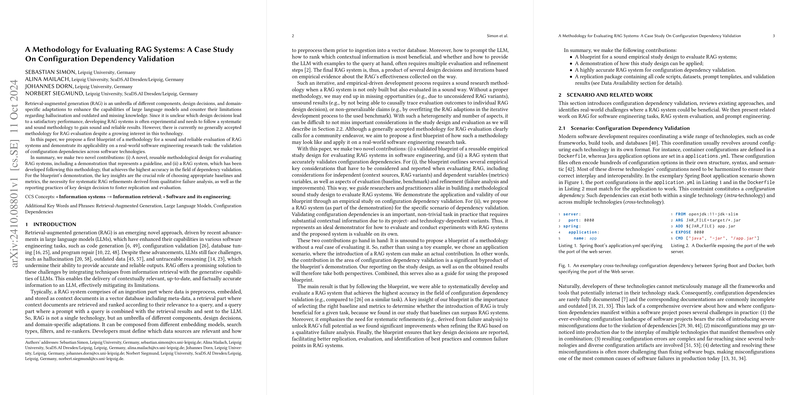Evaluating Retrieval-Augmented Generation Systems for Configuration Dependency Validation
The paper "A Methodology for Evaluating RAG Systems: A Case Study on Configuration Dependency Validation" presents a structured approach to the evaluation of retrieval-augmented generation (RAG) systems. This methodology is demonstrated through the case paper of configuration dependency validation, a complex task within software engineering.
Key Contributions and Methods
The authors propose a comprehensive evaluation methodology involving several core components: context resources, RAG architecture, baselines, benchmarks, and systematic refinements. This methodology is designed to ensure empirical rigor and facilitate effective assessment and reporting of RAG systems.
In the context of this paper, the proposed RAG system targets the validation of configuration dependencies, which is crucial for coordinating different software technologies. The system processes data from multiple sources, including Stack Overflow and GitHub repositories, using a pipeline that spans data ingestion, retrieval, and generation phases.
Evaluation and Findings
The paper formulates research questions focusing on the efficacy of vanilla LLMs compared to unrefined RAG systems in validating configurations, and explores the nature of validation failures. It details the setup for experimentation utilizing four state-of-the-art LLMs, including proprietary and open-source models.
Results indicate that vanilla LLMs show a range of performance capabilities, with substantial variability in precision and recall across models. Notably, an unrefined RAG system generally does not improve validation performance, suggesting the need for careful system refinement to leverage RAG advantages adequately.
Refinement and Re-Evaluation
Following a qualitative analysis of failure patterns, targeted refinements were applied to the RAG system, including enhancements in context provision and prompt adjustments. These refinements led to significant improvements in validation accuracy, with smaller LLMs benefiting notably from the added contextual support. Comparison on a holdout test set illustrated that the refined RAG systems surpassed both the refined and unrefined baselines across various metrics.
Implications and Future Directions
The paper underscores the potential benefits of RAG in enhancing the accuracy of configuration dependency validation, but also highlights that raw RAG implementations may not automatically improve performance without careful system tuning. The methodology provides a valuable framework for other researchers seeking to evaluate and refine RAG systems in various applications. The insights from this paper suggest that future work could focus on optimizing retrieval strategies and further exploring the interaction between different RAG components.
In conclusion, this paper offers a robust methodology for evaluating RAG systems, which is crucial given the increasing interest and ongoing research in this domain. The detailed description of the pipeline, along with the public availability of the dataset used, enhances the paper's replicability and provides a critical reference point for further advancements in RAG systems within software engineering.
